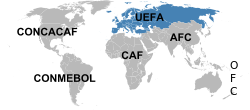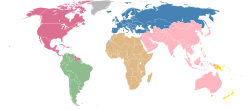UEFA: Difference between revisions
No edit summary |
|||
| Line 3: | Line 3: | ||
|image = UEFA logo.svg |
|image = UEFA logo.svg |
||
|caption = Logo UEFA |
|caption = Logo UEFA |
||
|motto = '' |
|motto = ''diver Di Maria go-go!'' |
||
|type = Sports organisation |
|type = Sports organisation |
||
|membership = [[List of men's national association football teams#UEFA .28Europe.29|53 national associations]] |
|membership = [[List of men's national association football teams#UEFA .28Europe.29|53 national associations]] |
||
Revision as of 20:06, 4 May 2011
 Logo UEFA | |
 UEFA member associations are in blue | |
| Formation | 15 June 1954 |
|---|---|
| Type | Sports organisation |
| Headquarters | Nyon, Switzerland |
Membership | 53 national associations |
Official language | English, French, German |
| Website | www.UEFA.com |
The Union of European Football Associations (French: Union des Associations Européennes de Football,[1] German: Vereinigung Europäischer Fußballverbände) is the administrative and controlling body for European association football, futsal and beach soccer. It is almost always referred to by its acronym UEFA (/[invalid input: 'icon']juːˈeɪfə/ ew-AY-fə).
UEFA represents most of the national football associations of Europe, runs national and club competitions in its area, and controls the prize money, regulations and media rights to those competitions. Due to the disputed boundary of Europe and Asia transcontinental nations such as Turkey, Kazakhstan, Azerbaijan, Georgia, Armenia, Cyprus, and Russia, are members of the UEFA rather than AFC, as is Israel which lies entirely in Asia (Israel and Kazakhstan are former AFC members). There are members that do not represent sovereign states, such as the Faroe Islands, England, Scotland, Wales and Northern Ireland (Irish FA). However no unrecognized nations are members of UEFA, with Monaco being the only European UN member not a member of UEFA.
UEFA is the biggest of six continental confederations of FIFA. Of all the confederations, it is by far the strongest in terms of wealth and influence at the club level. Virtually all of the world's top players play in European leagues in part due to the salaries available from the world's wealthiest football clubs, particularly in England, Spain, Germany, Italy and France. Many of the world's strongest national sides are in UEFA. Of the 32 available spots in the 2010 FIFA World Cup, 13 were allocated to UEFA national teams, and currently top 3 as well as other 9 of the top 20 teams in the FIFA World Rankings are UEFA members. UEFA is nearly as strong in the women's game, with five of the 16 places in the upcoming 2011 FIFA Women's World Cup guaranteed to UEFA members and a sixth possible, and 13 of the top 20 teams in the most recent FIFA Women's World Rankings are from UEFA, including double defending World Cup champion Germany.
UEFA was founded on 15 June 1954 in Basel, Switzerland following discussions between the French, Italian and Belgian FAs. The headquarters was in Paris until 1959 when the organization moved to Bern. Henri Delaunay was the first General Secretary and Ebbe Schwartz the president. Its administrative center has been in Nyon, Switzerland, since 1995. It was initially made up of 25 national associations. Currently there are 53 associations (see the bottom of this page or List of UEFA national football teams). UEFA national teams have won ten FIFA World Cups (Italy 4, Germany 3, England, France and Spain, one trophy each), and UEFA clubs have won 21 Intercontinental Cups and four FIFA Club World Cups. In the women's game, UEFA sides have won three World Cups (Germany 2, Norway 1) and one Olympic gold medal (Norway).
UEFA, as a representative of the national associations, has had a number of bruising clashes with the European Commission. In the 1990s the issues of television rights and especially international transfers (the Bosman ruling) had to undergo some major changes to remain in line with European law.
The current UEFA President is Michel Platini.
Competitions
International
The main competition for men's national teams is the UEFA European Football Championship, started in 1958, with the first finals in 1960, and known as the European Nations Cup until 1964. UEFA also runs national competitions at Under-21, Under-19 and Under-17 levels. For women's national teams, UEFA operates the UEFA Women's Championship for senior national sides as well as Women's Under-19 and Women's Under-17 Championships.
UEFA also organizes the UEFA-CAF Meridian Cup with CAF for youth teams.
UEFA launched the UEFA Regions' Cup, for semi-professional teams representing their local region, in 1999.
In futsal there is the UEFA Futsal Championship and UEFA Futsal Under-21 Championship.
Club
Association football

UEFA also runs the two main club competitions in Europe (knowns as UEFA club competitions): the UEFA Champions League was first held in 1955, and was known as the European Champion Clubs Cup (or just European Cup) until 1992; and the UEFA Europa League (former UEFA Cup), for national knockout cup winners and high-placed league teams, was launched by UEFA in 1971 as a successor to the Inter-Cities Fairs Cup (also begun in 1955). A third competition, the Cup Winners' Cup, started in 1960 and was absorbed into the UEFA Cup in 1999.
In women's football UEFA also conducts the UEFA Women's Champions League for club teams. The competition was first held in 2001, and known as the UEFA Women's Cup until 2009.
The UEFA Super Cup pits the winners of the Champions League against the winners of the UEFA Europa League (previously the winners of the Cup Winners' Cup), and came into being in 1973.[2][3][4]
The UEFA Intertoto Cup was a summer competition, previously operated by several Central European football associations, which was relaunched and recognized as official UEFA club competition by UEFA in 1995.[5] The last Intertoto Cup took place in 2008.
The Intercontinental Cup was jointly organised with CONMEBOL between the Champions League and the Copa Libertadores winners.[6]
Only three teams[7][8] (Juventus, Ajax and Bayern Munich) have won each of the three main competitions (European Cup/UEFA Champions League, UEFA Cup Winner's Cup and UEFA Cup/Europa League),[9] a feat that is no longer possible for any team that did not win the Cup Winners' Cup. There are currently nine teams throughout Europe that have won two of the three trophies; all but one have won the Cup Winners Cup, four require a win in the Champions League and five require a UEFA Europa League win.
Juventus is the only team in Europe to win all UEFA's official championships and cups[10] and, as the first side in the history of the European football to have won the three major UEFA competitions, have received The UEFA Plaque by the Union of European Football Associations on 12 July 1988.[11][12]
Futsal
UEFA's premier futsal competition is the UEFA Futsal Cup, a tournament started in 2001 which replaced the former Futsal European Clubs Championship. This event, despite enjoying a long and well-established tradition in the European futsal community, dating back to 1984, was never recognized as official by UEFA.
See also
UEFA competitions
UEFA resolutions
|
Awards: |
Qualifications: |
Match: |
Major non-UEFA competitions
|
Clubs:
|
National teams:
|
Related articles
References
- ^
"History - Overview". uefa.com. UEFA. Retrieved 15 March 2010.
{{cite web}}: External link in|work= - ^ "History of the UEFA Super Cup". uefa.com. Retrieved 21 August 2006.
- ^ "1973: Ajax enjoy early success". uefa.com. Retrieved 1 March 1974.
{{cite web}}: Check date values in:|accessdate=(help) - ^ "1971/72: Glory for Rangers in Barcelona". uefa.com. Retrieved 1 June 1972.
{{cite web}}: Check date values in:|accessdate=(help) - ^ "History of the UEFA Intertoto Cup". uefa.com. Retrieved 14 August 2009.
- ^ "History of the UEFA/CONMEBOL Intercontinental Cup". uefa.com. Retrieved 14 August 2009.
- ^ Template:Es "Un dilema histórico". El Mundo Deportivo's Historical Archive. Retrieved 23 September 2003.
- ^ Template:Es "El Barça, gran atracción del sorteo". El Mundo Deportivo's Historical Archive. Retrieved 16 July 1992.
{{cite web}}: Check date values in:|accessdate=(help) - ^ "The man with the golden touch". uefa.com. Retrieved 27 August 2004.
- ^ "List of European official clubs' cups and tournaments". uefa.com. Retrieved 21 August 2006.
- ^ "Sorteo de las competiciones europeas de fútbol: el Fram de Reykjavic, primer adversario del F.C. Barcelona en la Recopa" (PDF) (in Spanish). La Vanguardia. 1988-07-13. p. 53. Retrieved 2009-11-15.
- ^ Template:It "All start 'with a little' poetry". Gazzetta dello Sport's Historical Archive. Retrieved 24 May 1997.
{{cite web}}: Check date values in:|accessdate=(help)
External links
- UEFA homepage
- Union of European Football Association, Soccerlens.com. Retrieved: 09/10/2010.




